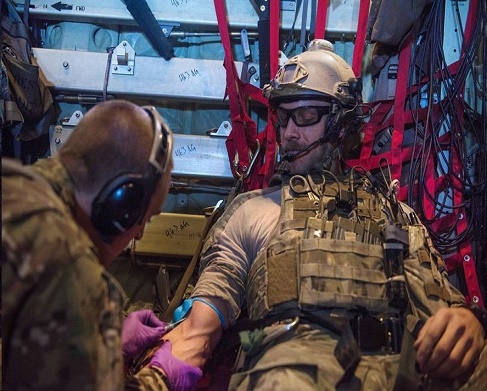Coalition Precision Strike Kills Senior ISIL Leader: Pentagon
A Sept. 7 coalition precision strike near Raqqah, Syria, targeted and killed “Dr. Wa’il,” also known as Wa’il Adil Hasan Salman al-Fayad, one of the Islamic State of Iraq and the Levant’s most-senior leaders, Pentagon Press Secretary Peter Cook said in a statement issued on Sept. 16, 2016.
The deceased terrorist had operated as the minister of information for the terror organization and was a prominent member of its Senior Shura Council — ISIL’s leadership group, Cook said.
ISIL Propagandist

Wa’il oversaw ISIL’s production of terrorist propaganda videos showing torture and executions, the press secretary said.
Cook said Wa’il was a close associate of Abu Muhammad al-Adnani, the ISIL spokesman and leader who plotted and inspired external terror attacks. Al-Adnani was successfully struck and killed by coalition forces Aug. 30.
The removal of ISIL’s senior leaders degrades its ability to retain territory, and its ability to plan, finance, and direct attacks inside and outside of the region, Cook said.
“We will continue to work with our coalition partners to build momentum in the campaign to deal ISIL a lasting defeat,” the press secretary said.
Strikes in Syria
Attack, fighter and remotely piloted aircraft conducted 10 strikes in Syria:
— Near Abu Kamal, six strikes destroyed five ISIL supply routes, two oil well heads, six oil tanker trucks, a bulldozer and a bobcat.
— Near Shadaddi, a strike engaged an ISIL tactical unit and destroyed a vehicle.
— Near Dayz Az Zawr, three strikes destroyed eight ISIL oil tanker trucks and seven oil well heads.
Strikes in Iraq
Attack, fighter and remotely piloted aircraft as well as rocket artillery conducted seven strikes in Iraq, coordinated with and in support of Iraq’s government:
— Near Baghdadi, a strike engaged an ISIL tactical unit and destroyed a bunker.
— Near Albu Hayat, a strike engaged an ISIL tactical unit and destroyed an artillery system, a vehicle, a tunnel entrance and damaged another vehicle.
— Near Bashir, a strike engaged an ISIL tactical unit.
— Near Mosul, a strike engaged an ISIL logistics facility.
— Near Qayyarah, a strike engaged an ISIL tactical unit.
— Near Ramadi, a strike engaged an ISIL tactical unit and destroyed a building, a vehicle, a fuel truck and five rocket rails.
— Near Sultan Abdallah, a strike engaged an ISIL tactical unit and destroyed two mortar systems and a weapons cache.
Task force officials define a strike as one or more kinetic events that occur in roughly the same geographic location to produce a single, sometimes cumulative, effect. Therefore, officials explained, a single aircraft delivering a single weapon against a lone ISIL vehicle is one strike, but so is multiple aircraft delivering dozens of weapons against buildings, vehicles and weapon systems in a compound, for example, having the cumulative effect of making those targets harder or impossible for ISIL to use.
Accordingly, officials said, they do not report the number or type of aircraft employed in a strike, the number of munitions dropped in each strike, or the number of individual munition impact points against a target. Ground-based artillery fired in counterfire or in fire support to maneuver roles is not classified as a strike.
photo: Air Force Staff Sgt. Roderick Campbell has an intravenous needle placed into his arm during a recovery exercise at Bagram Airfield, Afghanistan, Sept. 3, 2016. Campbell is assigned to the 83rd Expeditionary Rescue Squadron. Air Force photo by Senior Airman Justyn M. Freeman


